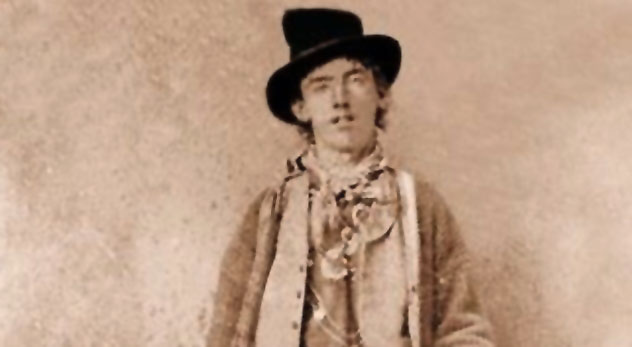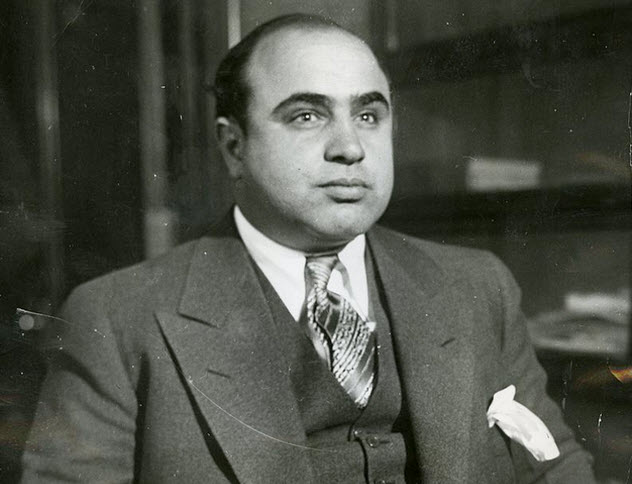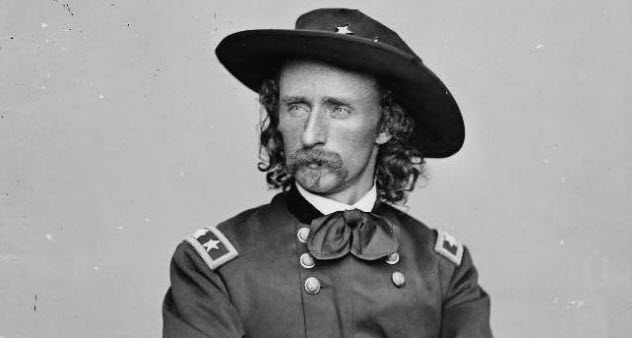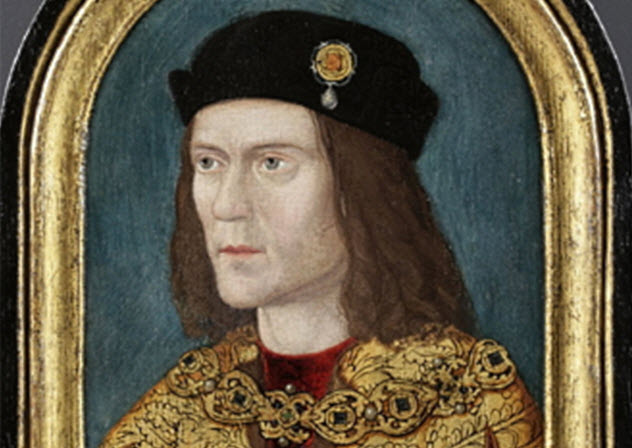10 Billy The Kid Was Almost Pardoned
At just 19 years old, William Henry McCarty Jr., aka “Billy the Kid,” had already achieved national infamy as one of the most well-known outlaws of the day. But by 1878, tired of his life of crime, he wrote to the newly appointed governor of New Mexico, Lew Wallace, that he was tired of fighting. In response, Wallace suggested that he would pardon Billy if he would testify before a grand jury about the Lincoln County War, a frontier conflict between two factions of New Mexico. Wallace had been appointed governor of New Mexico because of the Lincoln County War and, in an effort to end the violence, had offered amnesty to anyone involved. Billy turned himself in, testifying as promised, but Wallace refused to pardon him. None of those who came forward were given amnesty. In fact, Billy’s testimony helped over 50 men get charged. Billy escaped from confinement, embarking on his famous crime spree and prompting Wallace to offer a $500 reward for Billy’s capture. While being chased by the authorities, Billy murdered more people. In April 1881, he was finally captured, tried, and sentenced to hang. Billy made a daring escape, killing two guards as he fled. He was killed by Sheriff Pat Garrett in July 1881. Interestingly, in 2002, newly elected Governor Bill Richardson announced that he was looking into a posthumous pardon for Billy, 129 years after his death. A self-proclaimed history buff, Richardson began looking into the letters exchanged between Wallace and Billy. The descendants of Garrett and Wallace both say that Wallace had no intention of giving Billy a pardon. Others disagree. Finally, Richardson announced that he would not pardon Billy due to insufficient evidence.
9 Al Capone Started One Of The First Soup Kitchens
During the Great Depression and before the New Deal programs established by President Franklin Roosevelt, many unemployed citizens of America had nowhere to go when they were starving. However, churches, the wealthy, and other organizations established soup kitchens to help out. In Chicago, Al Capone established one such soup kitchen. During Prohibition and the Great Depression, many people hated the government. However, public opinion of bootleggers like Capone was high. His donations to charity and his establishment of a soup kitchen only made him more popular. In 1931, the Chicago Tribune proclaimed that “120,000 meals are served by Capone Free Soup Kitchen,” cementing Capone’s status as a “Robin Hood.” Many of those served by Capone said that he was doing more for the poor than the government. Capone played up his status as a good citizen by offering them jobs (with his front business, of course) and feeding over 5,000 men, women, and children on Thanksgiving Day in 1930. Despite being arrested and placed in prison, Capone kept the soup kitchen open. The building that housed the kitchen was demolished in the 1950s and is now a parking lot.
8 Osama bin Laden Had An Extensive Collection Of Pornography
After the 2011 raid that killed Osama bin Laden, books and computer files—including some containing pornography—were discovered in the compound where he had been hiding. This was a surprise considering bin Laden had long denounced the West for its obsession with sexuality. Bin Laden was 54 and living with three wives at the time he was killed. He had often complained about America’s exploitation of women. “Your nation exploits women like consumer products or advertising tools, calling upon customers to purchase them,” he once said. While it is not known whether the pornography belonged to bin Laden or to other men in the compound, it’s telling of the behavior of those who were in hiding. Despite their extremism when it came to “Western decadence,” they still had the same desires as most other men. The content of the pornography has not been declassified. According to a spokesperson for the director of national intelligence, these materials won’t be released because of the nature of the content.
7 Custer Had A Love Child With A Cheyenne Mistress
Lieutenant Colonel George Armstrong Custer will always be remembered for his defeat at the Battle of the Little Bighorn. But research by historians has shown that he may have had a relationship with a Cheyenne woman, resulting in an illegitimate son, despite his being married. This fact escaped history but was recently unearthed by researchers who were looking into his life. After the 1868 Washita River Massacre, Custer captured numerous women and children, making them prisoners of war. One of them was a Cheyenne woman, Meotzi, who became his interpreter despite her inability to speak English. Meotzi was a beautiful woman and Custer began to court her. She considered him her husband, becoming pregnant by him. Meotzi’s child was named Yellow Swallow because of his blond hair, a trait he no doubt inherited from his father. In 1869, Custer made peace with the Cheyenne Indians. He left Meotzi but promised to return. However, Custer and his men were killed in the Battle of the Little Bighorn. Custer was spared the mutilation of his men because he was recognized by the Cheyenne Indians as the husband of one of their own.
6 Ted Kaczynski Wanted A Sex Change
Ted Kaczynski, aka the Unabomber, is no longer a threat because he’s in prison for the rest of his life. But during the time he was free, he did much damage against society. He was a social critic and mathematical genius. But what finally made Kaczynski attack and harm people? According to him, it happened after a psychiatric visit when he was experiencing the desire to have a male-to-female operation. “Just then there came a major turning point in my life,” he said. “Like a Phoenix, I burst from the ashes of my despair to a glorious new hope. I thought I wanted to kill that psychiatrist because the future looked utterly empty to me.” Kaczynski had been experiencing issues with gender identity. Compounded with his other mental issues, that must have made him a very unstable man. When he lost the nerve to tell his psychiatrist about his problems, he decided to isolate himself from society. From there, he began to work on his twisted ideology, ultimately deciding that he would have to bomb buildings to get his message out. He began an 18-year crime spree to bomb and attack society until people would listen to his demands.
5 Richard III Was Not A Hunchback
In nearly every portrayal of the famed King Richard III, he is shown to be severely deformed in his back. However, in 2012, the skeleton of Richard III was discovered buried beneath a Leicester parking lot. When the body was uncovered, Richard’s spine was examined. It was indeed very bent. He suffered from a particularly severe form of scoliosis, a disease which causes the spine to curve. In 2014, the University of Leicester used CT scans of Richard’s spine and the rest of his body to produce a 3-D model of what Richard III may have looked like. What they found was a reasonably normal-looking man despite his dramatic scoliosis. Being a royal, Richard III could have easily afforded a tailor to make his clothes hide any deformities. However, the reason his scoliosis wasn’t so bad was because the bones of his spine were well-balanced. He was left short by a few centimeters, but only his insiders would have known about his deformity. According to most accounts written while he was alive, he was “of person and bodily shape comely enough.”
4 Jeffrey Dahmer May Have Been A Born-Again Christian
Jeffrey Dahmer was one of the most infamous serial killers in American history, but his story took a strange turn after he went to prison. In the months before he was killed in 1994, Dahmer became increasingly interested in the idea of salvation. We’ll never know whether his intentions were sincere. However, Curt Booth, a prison minister who visited Dahmer frequently, believes he was sincere. Booth said that Dahmer had come to him, expressing regret for what he had done and requesting a Bible course. After he completed the course, Dahmer requested to be baptized. But he was concerned that no minister would want to do so. Booth contacted Reverend Roy Ratcliff to make the proper arrangements. After his baptism, Dahmer received more Bible courses, which he distributed to other inmates, from minister David Hartman. During his correspondence with Hartman, Dahmer ominously mentioned a July 1994 attack on his life. The letter foreshadowed his murder in November of that year.
3 Fidel Castro Trafficked In Cocaine During The 1980s
Although Fidel Castro may have talked like he was against drugs in his country, he knew that they made an astronomical amount of money. During the 1980s, many of the Soviet countries that supported Cuba were struggling. As his country could barely stay afloat under these conditions, Castro allowed Cuba to be used to funnel drugs into the US. According to the CIA, Castro accepted cocaine as payment for weapons smuggled to Colombian Marxist guerrillas. Then Castro would have the cocaine distributed to America, using the profits to help keep Cuba afloat. “Castro saw it as a money-earning transaction for Cuba’s national security,” said a former CIA agent. When the DEA videotaped a sting operation, Cuban-American cocaine trafficker Reinaldo Ruiz bragged that he was shipping cocaine through Cuba. “The money that was paid to Fidel is in the drawer,” he said. Cuban officials accused Ruiz of lying. After the Iran-Contra affair, the CIA initially made plans to stop cocaine trafficking in Cuba but dropped them in 1989. General Jose Abrantes, who was involved in the trafficking, was going to be kidnapped by the CIA. But he was jailed and died of an apparent heart attack instead. Soon afterward, Castro washed his hands of the affair, conducting a show trial for the world of several high-ranking generals who were ultimately punished for trafficking cocaine.
2 Kim Jong Il Was An Opera Impresario
Before taking over North Korea in 1994, Kim Jong Il was credited with staging the opera Sea of Blood, based on a book written by his father, Kim Il Sung. Premiering in 1971 in Pyongyang, the opera was highly successful. In fact, the touring company was named “Sea of Blood.” The oppressive nature of the North Korean government is well known, so it might seem that the opera was praised because it was written by the leader of North Korea. But it actually has its merits. When the opera company staged the Chinese drama Dream of the Red Chamber in Beijing in 2010, it received wide acclaim by both Chinese and Western critics. When the company was asked about their success, they responded, “We took the guidance and suggestions of our Dear Leader.” Kim Jong Il was trained in theater, music, and film. He focused on North Korea’s film industry while his father was dictator. After successfully managing films, Kim Jong Il moved on to opera, staging Sea of Blood. He went on to produce and stage Dream of the Red Chamber and Eugene Onegin. It seems odd that an artsy type like Kim Jong Il would simultaneously starve and enslave his people while staging spectacular musical productions.
1 Saddam Hussein Was A Novelist
Saddam Hussein may have been one of the most brutal dictators in history, but he was also a man of letters. In 2000, Zabibah and the King was published in Iraq, becoming an instant best seller. Of course, seeing as it was written by their ruler Saddam Hussein, his people bought the book. When it was first published, Hussein remained anonymous, with the book credited to “he who wrote it.” The book was a metaphor about a medieval Iraqi king (Hussein), his romance with commoner Zabibah (the people), and a conflict with a brutal man who rapes her (the US). It covered politics, romance, and even bestiality. According to the CIA, the book was ghostwritten. But after Zabibah and the King was published, the same anonymous author wrote another romantic novel, The Impenetrable Fortress. Like the first book, this novel became a best seller. Hussein published two more novels before he was forced to go into hiding. Even when he had clearly lost control of Iraq, he wrote another novel and some poetry. He continued like this until his execution in 2004. Gordon Gora is a struggling author who is desperately trying to make it. He is working on several projects, but until he finishes one, he will write for Listverse for his bread and butter.
























